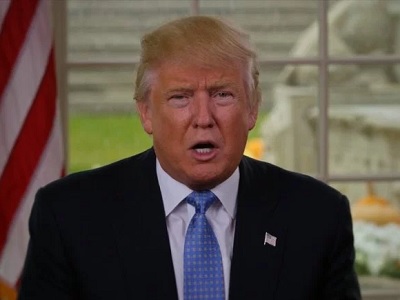
By Yoav Litvin
Since his election as the 45th President of the United States, Donald Trump has been fighting multiple fronts: “Russiagate” has persistently remained on the mainstream agenda, the media has been highly critical of his cabinet appointments, a spike in xenophobic and anti-Semitic incidents in the U.S. has been attributed to his associations with the “alt-right”, and after his failed attempt at repealing Obamacare members of his own party have been on the attack, smelling blood. With record low approval ratings in recent polls, Donald Trump has been in desperate need of a miracle.
On April 4th, residents of the rebel-held city Khan Sheikhoun in Idlib province, Syria were attacked with chemical weapons. Trump quickly seized on this Syrian catastrophe as an opportunity.
Prior to any kind of formal investigation, The White House determined that the Assad regime was responsible for the attack, with Trump flip-flopping on a statement made less than a week beforehand by his Ambassador to the UN Nikki Haley who stated that Assad’s removal was “no longer a priority”.
On April 5th Trump removed Stephen Bannon from the National Security Council (NSC). Bannon championed Trump’s “America First” doctrine and was opposed to military action in Syria. Further, the move appeased the liberal establishment that was critical of Bannon’s fascistic “alt-right” and White supremacist associations.
Thus, after neutralizing opposition from within (Steve Bannon) and instilling the appropriate local propaganda (Sean Spicer), a strike on Syria would align Trump with establishment conservatives and neoliberals, as well as the corporate media.
Trump’s gambit worked.
On April 6th, to quote CNN’s political pundit Fareed Zakaria, “Trump became President” when he bombed Syria. Indeed, Trump was immediately embraced by an adoring and uncritical American media (also here), as well as by a bipartisan political establishment.
But what did Syria’s immediate neighbor and America’s closest ally in the Middle East – Israel – think of a strike so close to home? Israeli support is fundamental to the survival, success and popularity of American Presidents, and Trump knows this well.
Israeli Consensus
Trump’s courtship of Israel has been ongoing.
It fully took off at the American Israel Public Affairs Committee (AIPAC) conference in March, 2016. Since, Donald Trump has proven his loyalty to right-wing Zionists by supporting the expansion of Israeli settlements and the annexation of parts of the West Bank, prioritizing the controversial move of the American embassy from Tel Aviv to Jerusalem, announcing the death of the two-state solution during Israeli Prime Minister Benjamin Netanyahu’s visit to the White House and appointing his bankruptcy lawyer David Friedman as ambassador to Israel. Only recently, Nikki Haley received a “rockstar welcome” at the annual 2017 AIPAC meeting when she promised to treat what the Israeli government and its allies view as an inherent bias against Israel at the UN.
Trump’s April 6th strike on Assad forces was yet another advance in his longstanding bromance with Netanyahu.
In Israel the strikes were met with resounding approval and even applause; nothing reassures Israelis more than an American show of force in the “rough neighborhood of the Middle East”. The last time a bombing was met with such glee in Israel was during Operation Protective Edge in 2014, when residents of Sderot gathered on hilltops opposite Gaza to watch its bombardment by the Israeli Defense Force (IDF).
Israeli Propaganda
“Wall to wall support in Israel for US attack on Syria” claimed Gil Hoffman of the Jerusalem Post in a recent piece that laid out a seemingly rare case of political agreement in Israel, whereby Netanyahu’s government coalition and its opposition were unanimous in their support of Donald Trump’s decision to bomb Assad’s army. From Zehava Gal-On (Meretz), Isaac Herzog (Zionist Union) and Tzipi Livni (Zionist Union) to Oren Hazan (Likud), Tzipi Hotovely (Likud) and Moti Yogev (Bayit Yehudi) the Israeli political spectrum was presented as lock, stock and barrel behind Donald Trump.
But does such a consensus really exist throughout the entirety of the Israeli political spectrum?
A closer look at the article reveals that by “wall to wall support” the right-wing Jerusalem Post only considered Zionist parties, while completely ignoring the Arab Joint List, no small party at 13 mandates making it the third largest in the Israeli Knesset.
In fact, the Joint List was unanimous in its disapproval of the American bombing, but could not agree on a condemnation of Assad as responsible for the chemical weapons attack. Although Israeli Defense Minister Avigdor Lieberman was “100% sure” the attack was perpetuated by Assad’s forces, members of the Joint List remained unconvinced, siding with Assad’s regime over his opposition or claiming that regardless of the perpetrators, American intervention is counterproductive as is all other foreign intervention, including Russian.
In contrast to the uniform Zionist support for Trump, the subtleties of opinion and disagreements within the Joint List faithfully echo the long-lasting and ongoing worldwide debate over the war in Syria. Thus, the omission of The Joint List from the Jerusalem Post’s pro-Trump propaganda piece was clearly not an oversight, but meant to convey unanimous Israeli support for Trump’s aggressive tactics, while disregarding those who do not serve the expansionist Zionist objectives. After all, Assad represents a united Syria to which the occupied Golan Heights can theoretically be returned as a condition for peace. Further, Assad serves as a key ally of Israel’s mortal enemy Iran and a channel from which the Lebanese Shiite militia Hezbollah receives weapons from its Iranian benefactors.
Clearly, Trump’s gambit worked. For the price of 59 Tomahawk missiles, he managed to align himself with the DC establishment, recapture corporate media, distance himself from the controversial and fascistic Bannon and as an added bonus, increase his popularity among American Jews and Israelis. His move threw egg in the face at those who underestimated his prowess and opportunism.
– Yoav Litvin is a doctor of psychology/behavioral neuroscience, a documentary photographer and writer living in New York City. He contributed this article to PalestineChronicle.com.





